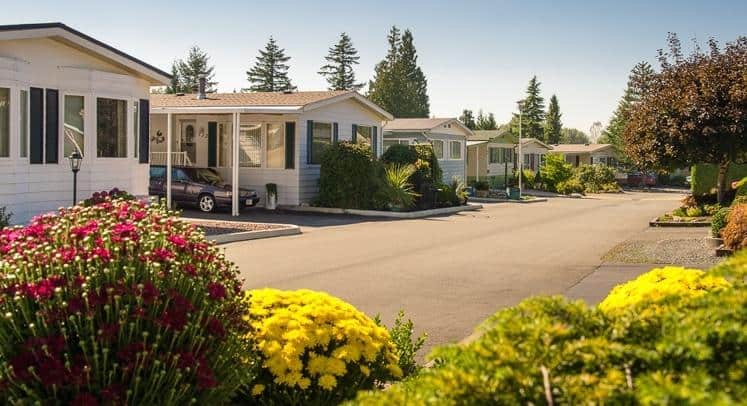Mobile home living conjures up images of cluttered homes, trailer-trash talk and the iconic Trailer Park Boys TV show.
Those stereotypical images belie the reality of the modern mobile home development. B.C. real estate agent Sharon Lenning of Macdonald Realty Olympic in Surrey does approximately 90 per cent of her business dealing with first-time home buyers and down-sizing retirees who are scrambling to get into manufactured home developments. The buy-in for a new home, an hour’s drive from downtown Vancouver, can be less than $100,000. A refurbished home can be purchased for as little as $69,000.
Lenning moved into a manufactured home in Parkbridge’s Langley Grove Estates with the intent of moving closer to a family member. “It was just for a year, but we ended up staying for nine,” she says. “I liked the people and the sense of community. I had everything I needed in my home.” It was only after her family quadrupled in size that she moved to a detached house on half an acre.
“The quality of manufactured homes has risen (during) the past decade and they are an affordable alternative,” says Parkbridge vice-president of sales and marketing Rob Tallis. Pre-fabricated construction is growing in popularity in B.C. as it provides for enhanced quality control in the plant environment compared to on-site construction. “As well, there is the environmental footprint,” says Tallis, adding the number of trucks normally delivering product to the traditional building site is reduced.
Today’s manufactured home is a far cry from old mobile home that was plopped on blocks and skirted. It can be moved, but is intended to stay on site and looks like a detached family home on a small lot or pad. Parkbridge creates a community feel to its developments, says Tallis, by offering amenities such as a pool and community centre, co-ordinated activities and an on-site manager.
Parkbridge, which has five retirement communities and five family developments in B.C., recently announced new and refurbished products at three of its B.C. sites: Crestway Bays, Crispen Bays and Breakaway Bays in Surrey.
There are three ways that individuals can buy into a Parkbridge development. They can purchase a new approved manufactured home through the company, which earns a margin on the sale. The home is delivered to a lease site that Parkbridge owns.
The company also buys existing homes from individuals leaving the community, refurbishes them and puts them back on the market.
The other option is to buy directly from a homeowner within the site. However, individuals cannot move their own home on to the Parkbridge site. “We want to have some control over quality,” says Tallis.
Lenning says an experienced national property owner and management company such as Parkbridge is integral to creating and maintaining community standards and environment. There are still some “mom and pop” operations around, she cautions, but anyone buying into a complex should ensure the management is financially sound and able to maintain the community’s standards and amenities.
She began selling manufactured homes with leased pads by referral. “One referral led to another,” she says. The quality of manufactured homes and good management within these complexes has become a game changer for many seniors entering the market. “I do a lot of estate sales,” she says, adding that once retirees move into one of these communities specifically designed for retirees and realize the benefits, they are reluctant to move again.
The developments often have RV parking. “We paid $25 a month when we lived in ours,” she says. As well, there is the convenience of having neighbours who will care for your property should you decided to travel. There is also the freedom of not having a large lot to attend to and some complexes offer a maintenance package as well.
Abdul Safi, mobile mortgage specialist for TD Canada Trust, says retirees are also seeing lower-cost manufactured homes as a means of freeing up equity. “They might have another home in Florida where they want to spend time,” he says. Both Safi and Lenning are seeing an influx of retirees coming from central or eastern Canada as many seek the milder winter climate of B.C.
But new entrants – young families – are also finding the detached manufactured home advantageous, he says. For many it becomes a means of building equity rather than renting.
Safi, who has worked in financing mobile homes for the past 12 years, says it is possible to purchase a home for as little as five per cent down as CMHC is underwriting the bank loans. However, the minimum loan is $20,000.
“The individual also needs a decent credit score,” he says, and the monthly payments of mortgage, rental pad and other related obligations cannot be more than 42 per cent of income.
He says that pad rentals vary – they can range from $400 to $850 per month depending on the pad size and the development. An individual might also opt for a maintenance package such as lawn care and snow removal.
It is a growth business as homes in urban centres become too pricey for many first-time buyers and empty nesters. Manufactured homes are also becoming popular in areas outside the major population bases, where individuals can find lower-priced lots.
Realizing the potential, Parkbridge is bringing forward new projects in B.C. ‘We will continue to look for development opportunities,” says Tallis, as more retirees move to B.C. The company is bringing forward a project in Kelowna and another project on Vancouver Island.
Jean Sorensen is a contributing writer for REM.



















